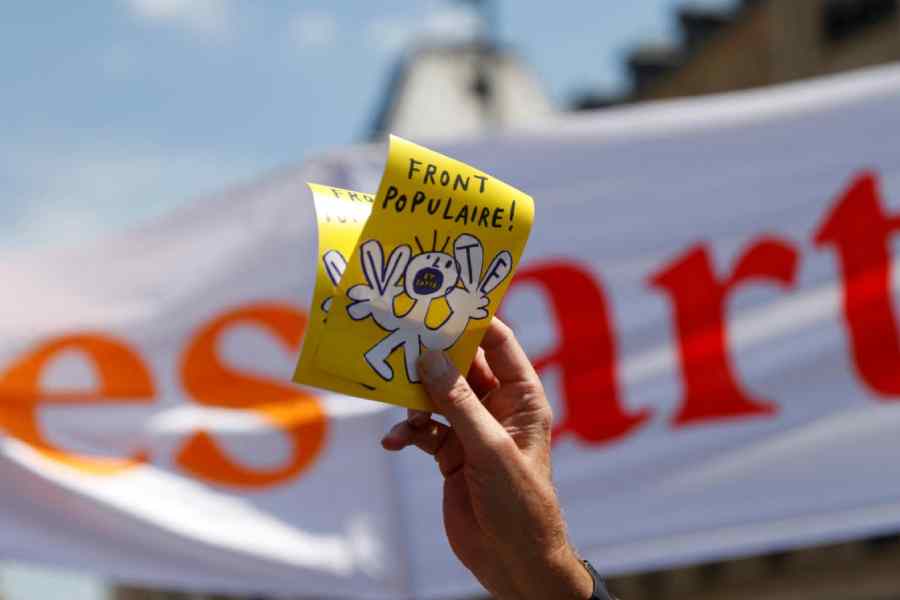The neoliberal regime had been politically championed by formations of the Centre, covering both the Centre-Right and the Centre-Left. Both Margaret Thatcher and Tony Blair were its enthusiastic proponents as were Manmohan Singh and P. Chidambaram in India who firmly belonged to the political Centre. The havoc caused by neoliberalism in the lives of the working people, through the immense growth in economic inequality, the stagnation or decline in the living conditions of large numbers, the growth in unemployment — all this even when the GDP growth rate appears to have been quite respectable — is giving rise to a veritable popular revolt, which is expressed inter alia by a rejection of the political Centre everywhere. This happened in India in 2014; the recent elections in Europe confirm this; and this is also one element underlying the very recent Bangladesh developments (though I shall not discuss Bangladesh here).
The party of Emmanuel Macron, who had called snap polls in France after getting a drubbing in the elections to the European Parliament, fared poorly again. In Britain, no doubt Keir Starmer’s Labour Party, belonging to the Centre-Left, came to power with a landslide win but this was entirely because of the poor performance of the Tories; Labour’s vote share increased only marginally, from 32.1% in 2019 to 33.8% in 2024. The fact that even when voters were moving massively away from the Tories they were not attracted by Labour is quite striking. The unpopularity of the Centre, blamed for the poor living conditions of the majority even as a small stratum gets hugely enriched under neoliberalism, is accompanied by a rise of both the Right and the Left, each promising an alternative trajectory.
This is evident in France where a hastily created New Popular Front (reminiscent of the Popular Front of the 1930s that had been formed to fight fascism) was elected as the largest bloc in Parliament. Marine Le Pen’s National Rally, though it missed power and came a close third behind Macron’s party, greatly increased its vote share and number of parliamentary seats. Likewise, the biggest gainer in the elections in the United Kingdom was the far-Right party, Reform UK, of Nigel Farage which got 14% of votes compared to the Tories’ 24%, while Jeremy Corbyn winning the North Islington seat as an independent after being hounded out of the Labour Party for his left-wing views is suggestive of substantial support for the Left, although there was no Left political formation contesting the elections.
In Germany, too, where the people’s deprivations arise substantially from the Ukraine war, the ruling political Centre, consisting of the Social Democrats, the Free Democrats and the Greens, toeing the American line on Ukraine, has lost popular support. The beneficiaries from this loss are not the Centre-Right Christian Democrats and the Christian Socialists but the far-Right AfD. It is significant that a new Left party led by Sahra Wagenknecht which wants an end to the Ukraine war and which broke away from the parent Left Party, Die Linke, because of the latter’s pusillanimous appeasement of the NATO, is doing well in opinion polls, indeed much better than the parent party; despite being in existence for just seven months, it is getting 7%-9% votes in opinion polls.
The political Centre is thus collapsing everywhere and it is the far-Right and the Left which are coming to the fore, even though the latter’s progress is often stymied by the absence of a proper political party free of the influence of compromisers. Even in India, the recent revival of the Congress is clearly associated with an economic programme that goes beyond neoliberalism, a programme closer to the Left.
There is, however, a basic difference between the Left and the Right with regard to economic agendas. The Right would ultimately and invariably compromise with neoliberalism and the corporate oligarchy backing it, as Giorgia Meloni did in Italy and also Narendra Modi in India; indeed, Jordan Bardella, the far-Right prime ministerial candidate in France, was already beginning to bow before neoliberalism in the run-up to the French elections. Actually, the collapse of the Centre is precisely the reason why the corporate oligarchy shifts its support to the far-Right, which provides a diversionary discourse that divides the working people by singling out some minority group and fomenting hatred against it. Such a diversion helps the corporate oligarchy retain its hegemony despite the loss of popular support for the economic programme espoused by it.
Groups belonging to the Left too can capitulate before international finance and the corporate oligarchy, as Syriza did in Greece. But when a Left group does not, as in France till date, it faces formidable obstacles in pursuing an alternative economic trajectory. Efforts are made to break its unity by weaning away vacillating elements within it. It is not even invited to form a government when the Constitution demands that it should; compromises are effected between the collapsing Centre and the far-Right to form a government excluding the Left. If perchance the Left forms the government and implements its programme, large-scale capital flight occurs, as it did when Francois Mitterrand became president of France and started an expansionary policy. And if, despite all these efforts, the Left remains committed to pursuing its alternative trajectory, then manoeuvres ranging from economic sanctions to coups d'état are tried against it to bring it down.
Neoliberalism in short is like an incubus that cannot be got rid of easily. How a country like France gets rid of it and reinvigorates democracy will be eagerly watched in the coming weeks.
Prabhat Patnaik is Professor Emeritus, Centre for Economic Studies and Planning, Jawaharlal Nehru University, New Delhi










